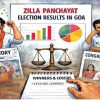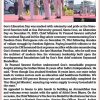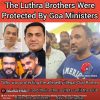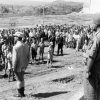Goa is abuzz with excitement as vintage bike and car owners, users, collectors and fans are decking […]
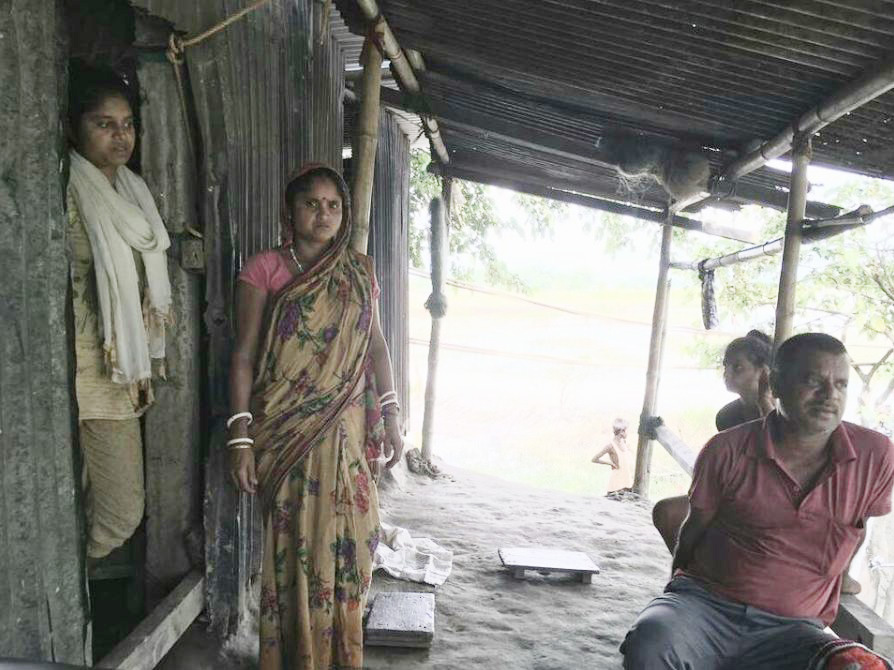
Jailed At 6 For No Crime
In the News, Sept 21- Sept 27 2019 September 20, 2019VICTIMS: (clockwise from left) Kalpana, Romoni, Archana and Dilip Biswas. Victims of government negligence and apathy, worse may be ahead \
By Piyasree Dasgupta
More than 19 lakh people in Assam were excluded from the final list of the NRC that was released by the government on August 31. Among countless victims, this is a look at one little girl whose life was destroyed by Assam’s ‘foreigner’ hunt
All of 15 years old, Kalpana’s friends had left — married, moved to towns to study — when she returned to her village in Assam earlier this year. But there was a bigger problem at hand, her 11-year-old sister Archana refused to speak to their father or share a room with him. And they had but one tiny room in the bamboo and mud hut atop a muddy hillock in Mayang, a village of roughly 700 people in Morigaon district.
Twelve years ago, Kalpana’s father Dilip Biswas had an argument with the village headman, who retaliated by falsely telling the police that the Biswas family was Bangladeshi. Three years later, the Biswas family was forcibly separated and incarcerated in separate facilities 300 kilometres away from their home: Kalpana, who was 6 years old at the time, and Archana, who was only 2, were marched off to a foreigner detention camp inside a jail in Assam’s Kokrajhar district along with their mother Romoni. Dilip was sent to another camp in Goalpara district.
They were released on bail in March this year, after a social worker familiar with their case referred it to Human Rights Law Network’s Guwahati branch and they moved court on behalf of him. When the Biswas family returned to Mayang, their children and the village they once called home had changed beyond recognition.
In the nine intervening years, Archana had grown into a quiet, self-possessed girl who had convinced herself that she did not have a father. Kalpana had run out of family memories of all four of them together, missed several years of school and can barely read or write. The sleepy village market where Dilip once sold snacks was teeming with brightly lit shops, while Romini found the roof of their home had given way in parts.
“What is jail like?” the children in school often asked Archana.
“Bhalo,” Archana would reply. Jail is good.
MISUSE OF POWER
On August 31 2019, Assam’s government shall release an updated National Register of Citizens — the culmination of a years-long exercise meant to separate Assam residents from so-called “outsiders”. A preliminary list, released in August 2018, excluded over 4 million residents.
Mid August, the government announced those people left out of the National Register for Citizens will not be immediately declared foreigners and will have 120 days to appeal their case. Others have warned against conflating the NRC process (which claims to be a register of Indian citizens in Assam) with the Foreigners Tribunal process (which aims to identify and eventually deport undocumented foreigners from Indian soil) — arguing that these are essentially two separate processes.
Yet, the Foreigner Tribunal process — and its victims like Biswas family — offer a terrifying glimpse of what most likely awaits those left out of the NRC. Events on the ground suggest that thousands of Assam’s linguistic, ethnic and religious minorities who fail the appeals process will find themselves before a Foreigners Tribunal with the scales unfairly tipped against them.
The plight of the Biswas family is emblematic of the ethnic prejudice baked into the process of ostensibly identifying so-called foreigners in Assam, and offers useful context to the circumstances in which the NRC process is being conducted.
The Biswas family is ethnic Bengali, but Dilip Biswas’s ancestors moved to Assam before Independence and even owned land in Morigaon district. However, the land was engulfed by the Brahmaputra during a flood — a persistent problem with many residents of riverside villages in Assam.
Biswas’ family moved homes twice after — both times the piece of land on which their hut stood washed away in the floods — and settled in Mayang, three years before he was arrested. His mother and his elder’s brother’s family was not summoned to prove their citizenship strengthening Biswas’ belief that the case against him was vendetta.
The fact that the land Biswas’ family owned 40 years ago does not exist anymore — though the papers proving they had land do — combined with his failure to turn up at hearings the first time round, went against him.
Lawyer Debasmita Ghosh, who heads HRLN’s Guwahati operations pointed out that the Assam Land and Revenue Regulation gives headmen the power to report ‘suspicious’ people occupying land in their respective villages. “Since these laws were never updated, they concentrated power in the hands of a few people and made many people like Biswas vulnerable,’’ she said. Ghosh, who has handled hundreds of foreigner tribunal cases, saw a clear pattern in the process of targeting people to prove their citizenship in tribunals. “The people pulled up by the police and then summoned by the tribunals are all poor, uneducated people like Biswas. People who work as maids, as labourers, carpenters,” she said.
Released on bail, Biswas and his family have not figured in the NRC. His ailing mother who saw her son barely two-three times in nine years, died a few weeks after Biswas was released. He also has to turn up at the local police station every day and sign a log book. Ghosh had written to the concerned circle officer repeatedly to vet Biswas’ documents in the past few months but his office claims that they are swamped with ‘NRC work’ and can only look into this later, after the final list is published.
A FIGHT AND A CONSPIRACY
Twelve years ago, in 2007, Dilip Biswas moved to Mayang and started to make a living selling snacks and tea at a small shop in the village market.
Biswas, who was born in Assam and lived there his entire life, knew there were rules to play as an ethnic Bengali minority in a remote village in the state. So the headman’s tea was usually complementary and his snacks, mostly free. Then one summer day, a couple of months after they had arrived in Mayang in 2007, the headman turned up with a group of men — nearly 10 or 12, said Biswas’ lawyer — and demanded all of them be fed for free. Biswas refused, there was a fight and the next he knew, the village headman had told the local police that he suspected Biswas to be a Bangladeshi.
The police in Assam makes a reference to a foreigner tribunal if they suspect someone’s nationality, the tribunal sends a notice and the concerned person has to prove that he is a citizen of the country with the documents he can furnish. Usually, testimonies of village headmen are considered crucial in proving citizenship as they are considered trusted resources to determine a person’s lineage. In Biswas’ case, that very man had raised concerns about his citizenship.
It was only after the police came to arrest him the first time, late in 2007, that Biswas realised what had happened and then appealed to Guwahati High Court against the Morigaon foreigner tribunal’s order. The high court referred it back to the tribunal and Biswas said, he spent the next three years, fighting a ‘lost’ case, against the combined forces of a largely unempathetic police, locals and even the tribunal judge who seemed to have taken offence at him not testifying the first time around and then moving HC against his order.
Ghosh pointed out that the staggering discrepancies in the case shocked her. “Biswas has documents showing his father owned land in Assam, the jamabandi (deed) was mutated to include his and his brother’s names after the father’s death and the document clearly mentions that the land was eroded by the river. Moreover, police had made a reference against just Biswas, the tribunal sent notices to his wife and 3-year-old daughter to prove their citizenship too. They could not even plead the case,” Ghosh said.
YEARS IN JAIL
Kalpana was in the first standard when they landed in the detention camp. She had barely learned to write alphabets in Bengali, Assamese and some English, recognise numbers when her education abruptly stopped.
“At first, we were told we would have to buy books and copies if we wanted for the children ourselves, where did we have the money?” Romoni said.
Kalpana remembers, months after they entered the detention camp, the superintendent gave her a few notepads, pencils and a couple of books. “But who would teach me? Most of the inmates were women like my mother, no one knew how to read or write,” Kalpana told HuffPost India. “Also, I had not learnt to read properly that I could learn from the books myself,” she said.
She can somewhat scribble her name in Bengali, but still occasionally gets the alphabet wrong, Archana pointed out as the sisters broke out in laughter. “My sister is very good in studies. She can even say sentences in English,” Kalpana added, beaming at the younger girl.
Slowly, Kalpana forgot what she learnt in school and when a teacher was finally appointed to teach children inside the detention camp, Kalpana was considered too old to attend the class.
“There were older boys and all. So I was not allowed to attend the class. Only, the children went there,” she said. But Kalpana did not give up. She lurked outside the class and watched as the teacher taught the younger children. “I remember one class… he was teaching them Sunday, Monday. I came back and tried to write them down on a notepad but the spellings were all wrong,” she said.
Non-profits often landed in the camps urging the women to give up the children for adoption or have them stay in orphanages. But Romoni refused. “They are not orphans. Also, both of them are girls. My family has no money to visit or take care of them. Who knows what will happen to them in that outside world, if we can be in jail for no crime, anything can happen,” she said, explaining, she realised they girls will be at least safe with her. A few months later, another NGO offered to enroll Archana into a local school — she and other children would be chaperoned by the prison guard to and back from school.
“One day, my sister came back and said she has had something called ‘kurkuri’ (Kurkure) and wished I could have too. A girl in the class had given her some,” Kalpana said, adding she kept haranguing her mother for some till she later yelled at her.
Unlike regular prisoners in jail, the women and men in detention camps are not given any work, which means they are also not paid a wage or allowance. So even when Archana went to school, she never had even a few rupees to purchase a biscuit or chocolate. “I used to hope my friends would give. And they did now and then,” she said.
THE LIFE AFTER
As one year blurred into the next, Biswas took help from an inmate and made him write more than a dozen letters he wanted to send Romoni. He gave the letters to the warden hoping he would send them to Romoni.
When he finally left the jail, the warden handed him a stack of letters saying they were never sent.
“I read them and later threw them away. They just bring pain,” Romoni said.
Biswas borrowed money from a man he met at the detention camp in Tezpur, another Bengali who runs a garage in Guwahati. He restarted his business but had enough money to buy only 5 utensils including spoons and spatulas. “I make the ghugni, some fritters, keep boiled egg and chana. But there are so many new shops, people barely come to mine,” he said.
Kalpana made a round of the houses she knew and found all her friends had left. So Archana introduced her to the girls she made friends with after coming out. But the elders ticked off Kalpana. “I saw a pond after so long. We were all running along it and some women came and pulled me away. I am not a child anymore, no?” she said, smiling apologetically.
Archana has been reading Peter Dickinson’s poems in school and often reads them out to her sister. “She sounds like a city girl,” Kalpana said, laughing.
When Romoni stepped out of the jail with her children, it felt like “coming out of the mother’s womb’, like she was born again. But Archana was least excited. “I don’t know him,” she murmurs when asked about her father.
“I couldn’t recognise them too when they came out. They have become so big! One policeman in the jail used to come and mock me, ‘your elder daughter is old enough to get married, you are still rotting here’,” Biswas said, breaking down moments later. Romoni quietly wiped her tears.
Kalpana is less morose. She goes to neighbour’s houses to watch TV, follows her sister around when she goes to play with her friend and helps her mother with household chores. “My favourite film is Hum Saath Saath Hai. You know, I like watching those films where mother, father, brother, sister are all together and singing and dancing, do you like it?” she asked this reporter.
Biswas and his family’s name have not figured in the NRC, his mother died a few months after he was released. “What new problem will happen now with the NRC?” he said. He also has to turn up at the local police station every day and sign a log book.
“I used to sing a song in the jail, it calmed me.”
“Amar baul ghore, hoi go, jonmo bare bar,
Ami chai na re shukh, chai na re dukh,
Ami bhikkha magigo dware dware,
Pai jaa, tai bhalo
(’Let me born as a wandering minstrel,
I don’t seek joy, I don’t seek pain,
I beg from door to door,
Whatever I get, I am happy with it.’)”
Courtesy: HuffingtonPost
By Pamela Philipose
The civic death of nearly two million in Assam has been met with an odd response from the rest of the country. How does one describe it? Ennui? Apathy? Acquiescence? Denial? Considering its ramifications, there has been surprisingly little public action or even conversation on it. A People’s Tribunal on “Contested Citizenship in Assam”, held recently in New Delhi, which unpacked the enormous human suffering and chaos unleashed by NRC procedures, was a rare initiative of its kind.
Could this indifference be because Assam has always stood on the periphery of the mainland’s consciousness, and the fate of its newly declared “non-citizens” even more so? Could it be because there is some cold comfort in the fact that those left out of the National Register of Citizens (NRC) were not quite so many as initially projected? The argument has been raised, after all, that the final NRC result has been somehow “fair”; that the very fact that nobody is happy over its outcome; that there are both Hindus and Muslims among those now deprived of citizenship, should buttress faith in the system.
Could it also reflect a certain relief that the “Bangladeshi” spectre will finally get to be exorcised? It’s been three decades now since Shiv Sena-led governments in Maharashtra drew political capital out of much publicised “deportation” drives involving the rounding up of terrified Bangla-speaking slum-dwellers, and packing them into trains headed for Kolkata. From election speech to election speech, their numbers were bumped up exponentially, growing from a few thousands to unstoppable millions. With religion as their main marker, they were profiled as job-stealers, bomb planters, destroyers of local cultures, grabbers of land.
The militarised terminology used to refer to people in search of better lives as “Muslim infiltrators”, marked not just the first information reports of the police. It permeated the language of the highest judiciary. The Supreme Court verdict in Sarbananda Sonowal vs Union Of India & Anr, delivered by the bench of R C Lahoti, G P Mathur and P K Balasubramanyan in 2005, quoted approvingly and without context, the communally coloured observations of a British official in the 1931 Census report, which saw migration as an “invasion” of “land-hungry immigrants, mostly Muslims”. The bench observed that the state of Assam is facing “external aggression and internal disturbance” on account of “large scale illegal migration of Bangladeshi nationals”. Such a communal framing has dominated the narrative on the issue over decades. But today, with a party committed to Hindutva in power both at the Centre and in Assam, such a framing has become politically weaponised.
The irony is that this seeming indifference to the NRC process and the possibility that it could alter forever the constitutional notion of citizenship, is taking place against a steel-like political resolve to extend it to the rest of India. Union Minister of Home Amit Shah has not just termed “illegal immigrants” as “termites”, he has continuously and emphatically iterated that his government will not allow “one single immigrant” to stay in India.
President Ram Nath Kovind was only reflecting this in his address to Parliament in July when he affirmed that his government “has decided to implement the process of National Register of Citizens on priority basis in areas affected by infiltration”. Baby steps in this regard have already been undertaken. On the very day it was sworn back to power on May 30, the Modi government moved to decentralise decision-making on foreigners’ tribunals. State governments and even lowly district collectors now have the power to set them up without a formal nod from the Centre. Another significant notification, involving the National Population Register, followed three months later. It is to be updated in 2020 and will allow the government to aggregate the personal data of people living across the country as a first step towards mapping, marking and classifying the population, should it choose to do so.
There is a curious paradox in all of this. At a time when India is searching for a top slot in the global order and possibly a seat in the Security Council, obligations undertaken by India vis-a-vis a slew of international treaties have either been discarded or trampled upon in NRC procedures. For instance, the right to the protection of the family as the “natural and fundamental group unit of society”, guaranteed under the Universal Declaration of Human Rights of 1948, has been violated extensively. Under the Convention on the Rights of the Child of 1989, to cite another example, a child “shall have the right from birth to a name, the right to acquire a nationality and as far as possible, the right to know and be cared for by his or her parents”. Yet, among the most searing testimonies during the recent people’s tribunal, were the impacts on children. In innumerable cases, parents are in the NRC but their children’s names don’t figure in it, and vice versa. A mother, who had lost her newborn while she stood under the sun without water to get her certification, wanted to know who had killed her baby.
Those who argue that India is under no obligation to conform to the letter and spirit of international treaties, need to be reminded that Article 51(c) of the Indian Constitution enjoins the fostering of respect for treaty obligations and many of these principles now inform national law today.
We understand citizenship as state-guaranteed right to have rights. We now need to become more conscious of statelessness as state-directed stripping of rights, and what it entails for the lives of those who are rendered alien and inaudible.
Courtesy: The Indian Express



